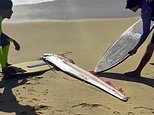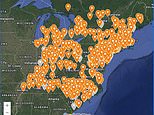They may look cute, but cows have a huge flatulence problem that is wreaking havoc on our planet.
Cattle produce huge amounts of methane – a greenhouse gas that is 23 times more potent than carbon dioxide in trapping heat in the atmosphere.
Now, scientists believe they may finally have a solution to this issue.
Experts from the University of California, Davis, say that feeding cows seaweed could stop them farting so much.
In fact, this tactic could slash cows' methane emissions by a whopping 40 per cent, according to the new study.
Best of all, the team says that seaweed would be easy for farmers to implement – and would not affect the cows' health or weight.
'This method paves the way to make a seaweed supplement easily available to grazing animals,' said Professor Ermias Kebreab, senior author of the study.
'Ranchers could even introduce the seaweed through a lick block for their cattle.'


Previous studies have shown that livestock account for 14.5 per cent of global greenhouse gas emissions.
And the largest portion comes from methane that cattle release when they fart and burp.
Grazing cattle (those allowed to roam around outside) also produce more methane than feedlot cattle (those raised in a feedlot) or dairy cows.
That's because they eat more fibre from grass.
'Beef cattle spend only about three months in feedlots and spend most of their lives grazing on pasture and producing methane,' explained Professor Kebreab.
Despite this, until now, researchers have only looked at the impact of feeding seaweed to feedlot cattle and in dairy cows.
This new study is the first to test seaweed on grazing beef cattle in the world.
For the 10-week experiment, the team headed to a ranch in Dillon, Montana, where they divided 24 beef steers into two groups.
One group received the seaweed supplement, while the other did not.
An analysis of the cows' flatulence revealed that the cows who consumed the seaweed supplement produced 40 per cent less methane than those who did not.
Based on the findings, the researchers are calling for a seaweed supplement to be rolled out to grazing cattle worldwide.
'We need to make this seaweed additive or any feed additive more accessible to grazing cattle to make cattle farming more sustainable while meeting the global demand for meat,' Professor Kenreab added.












